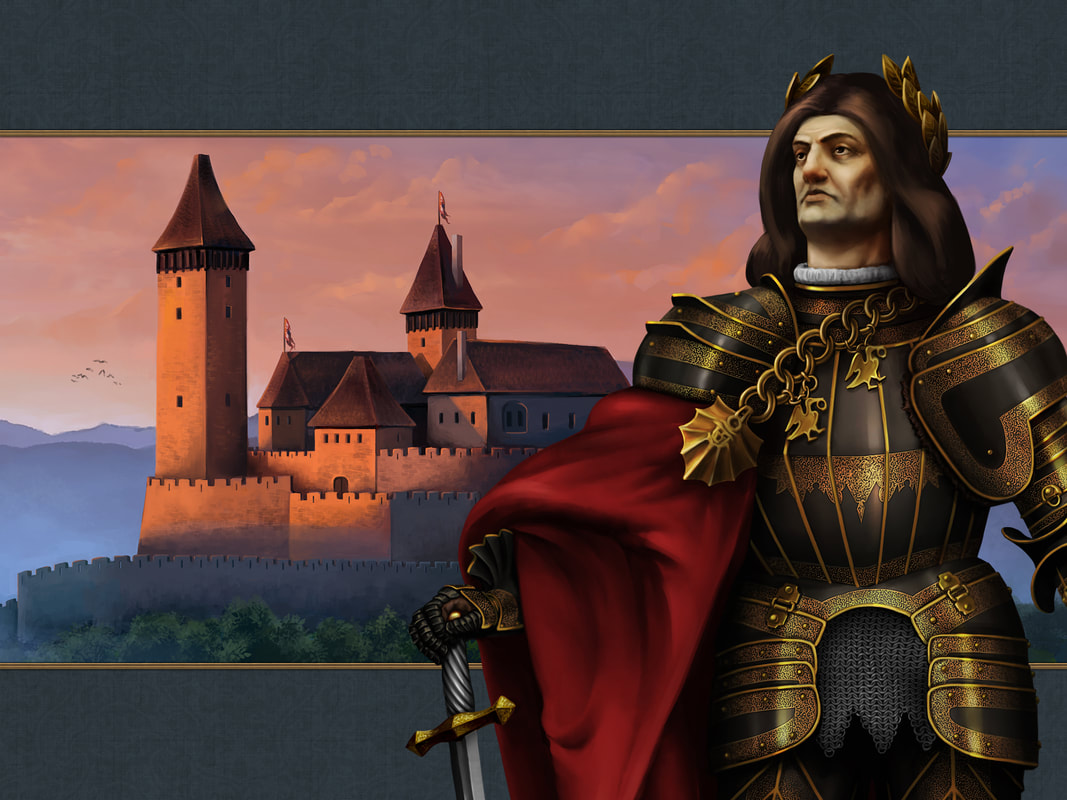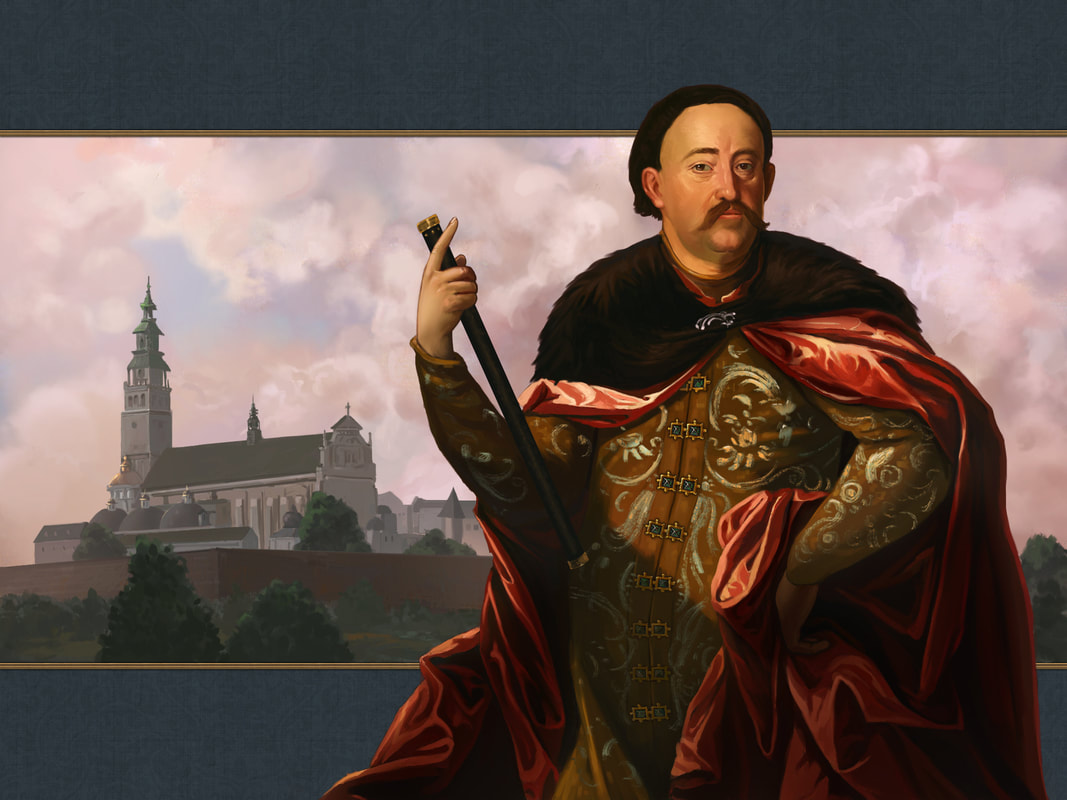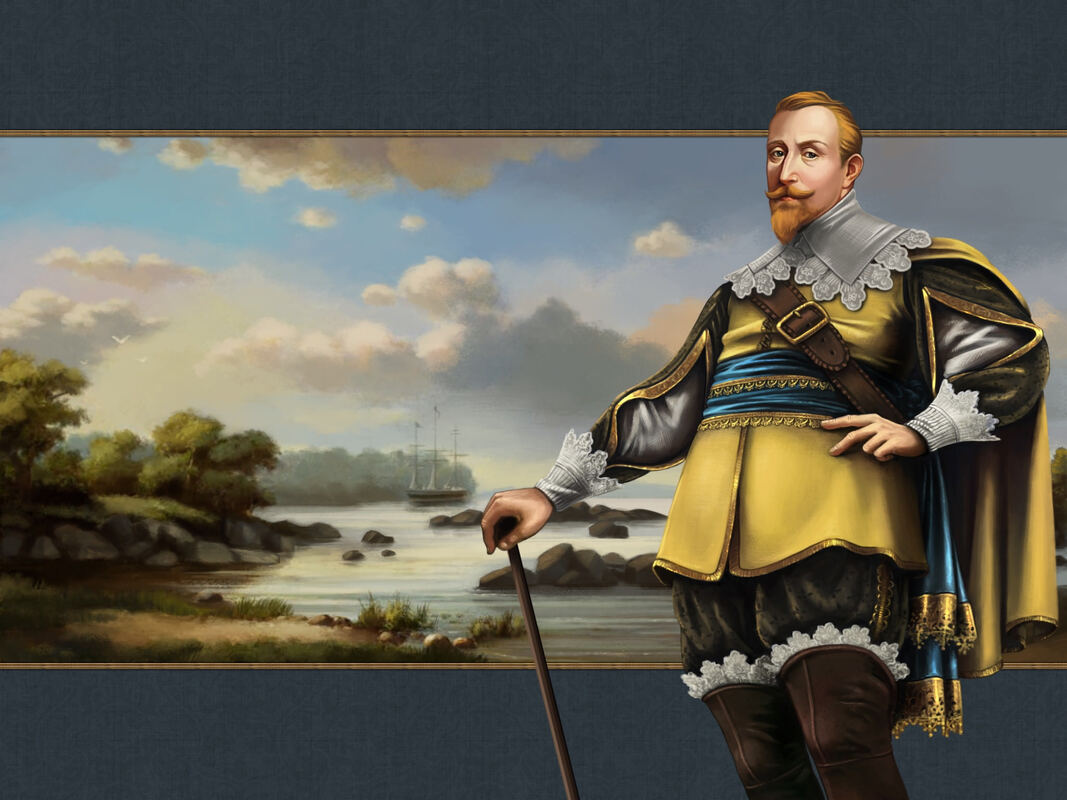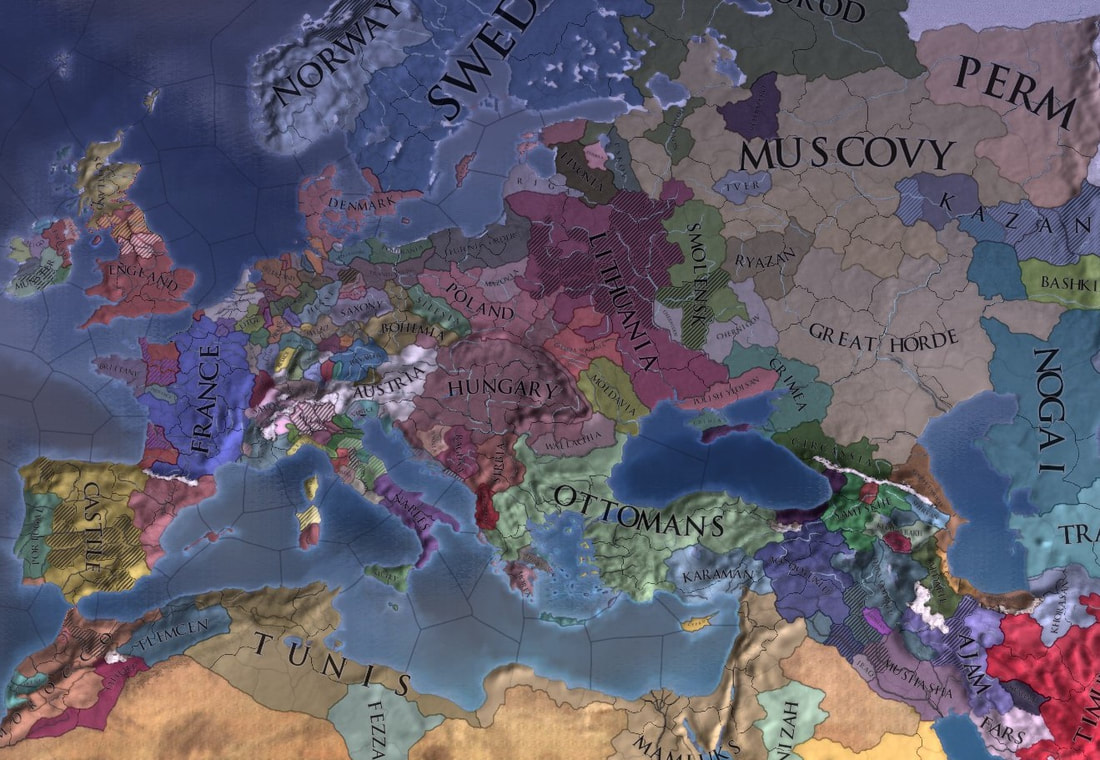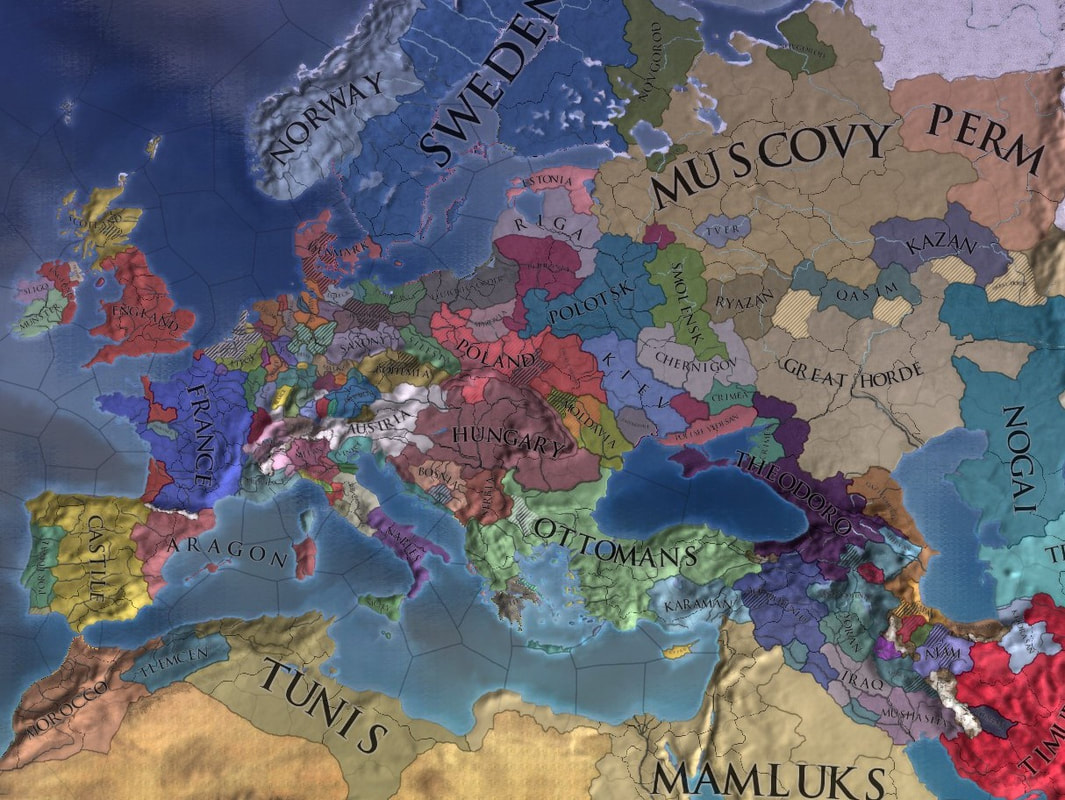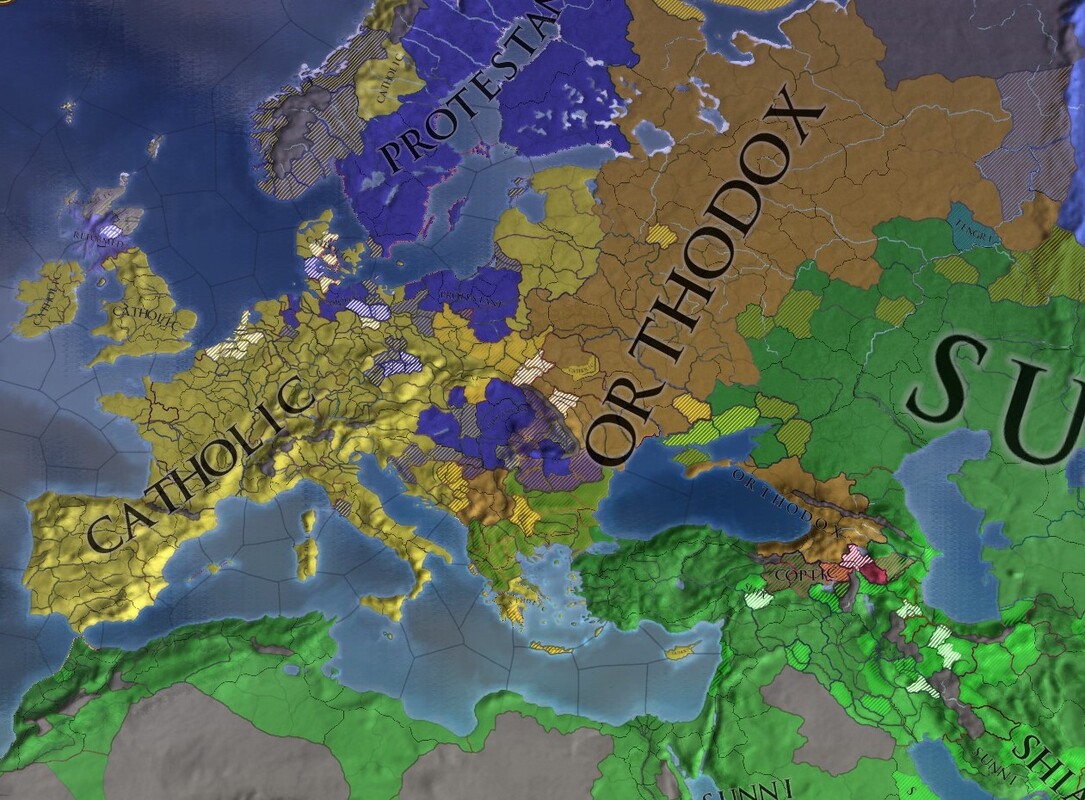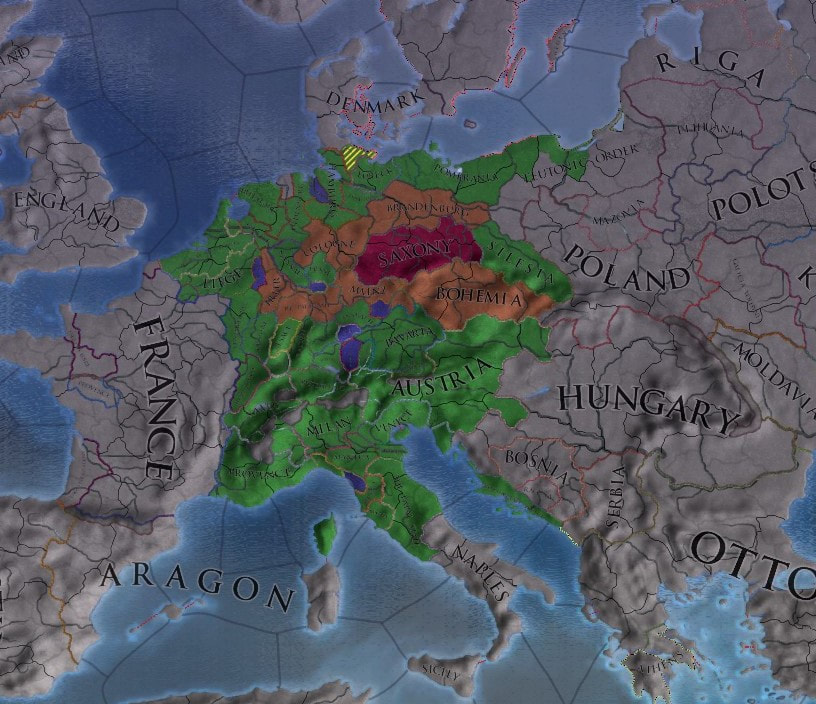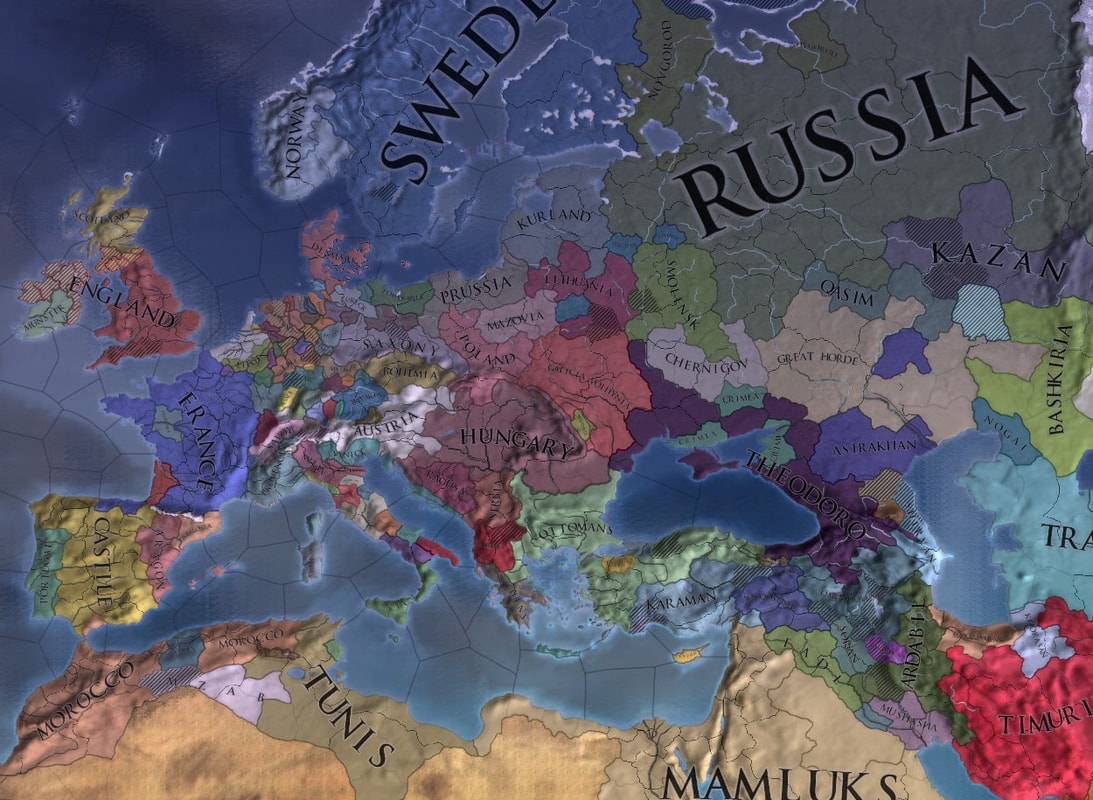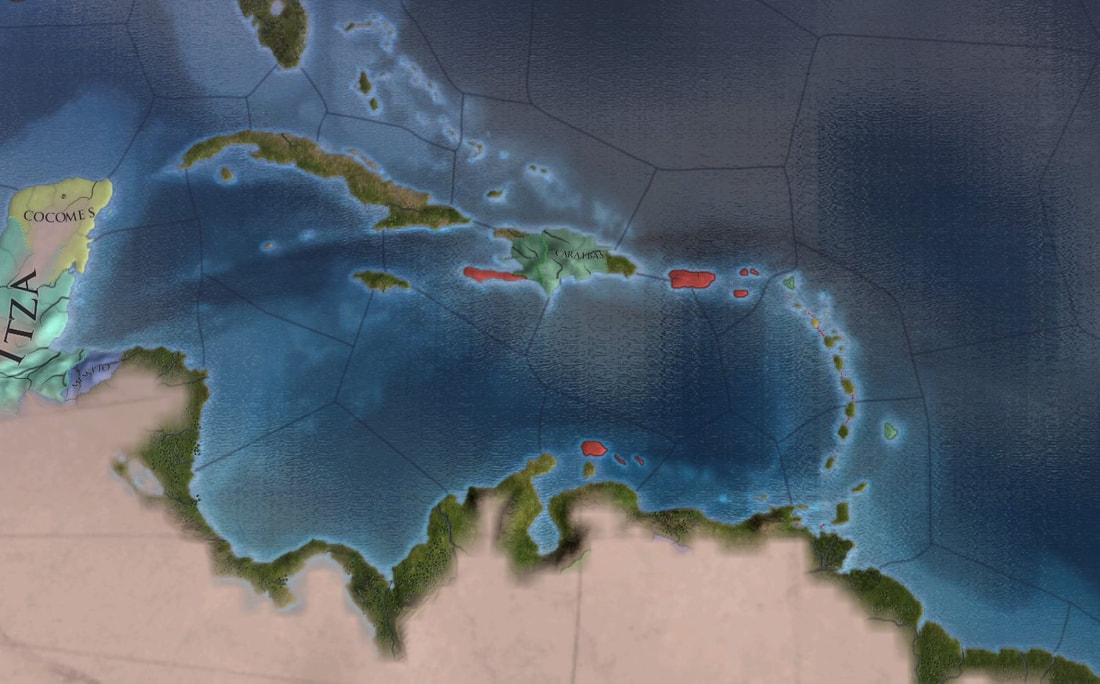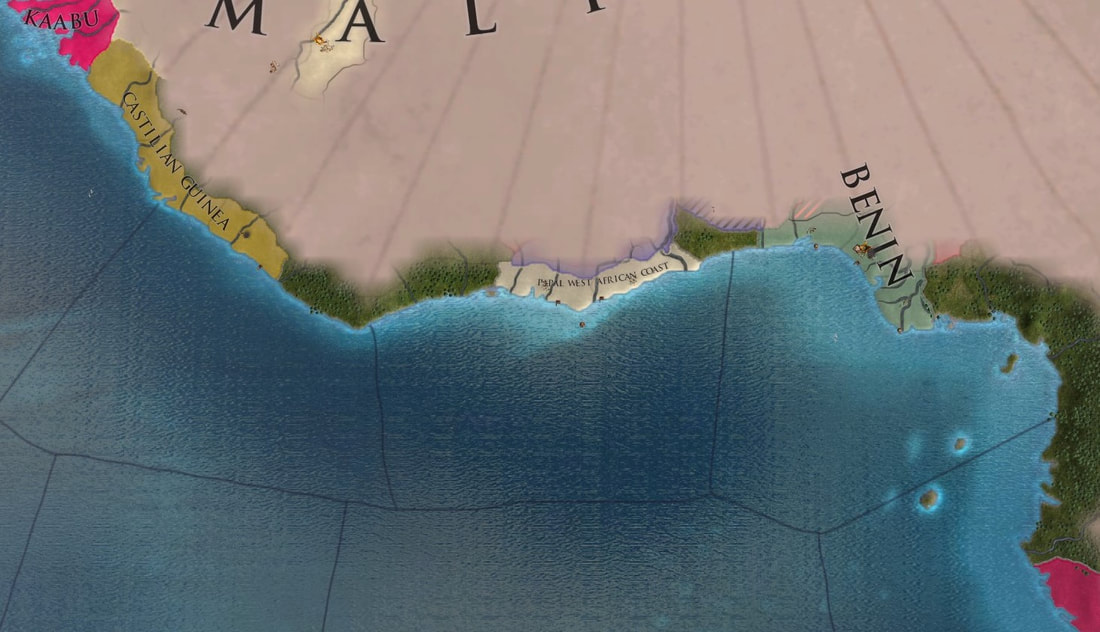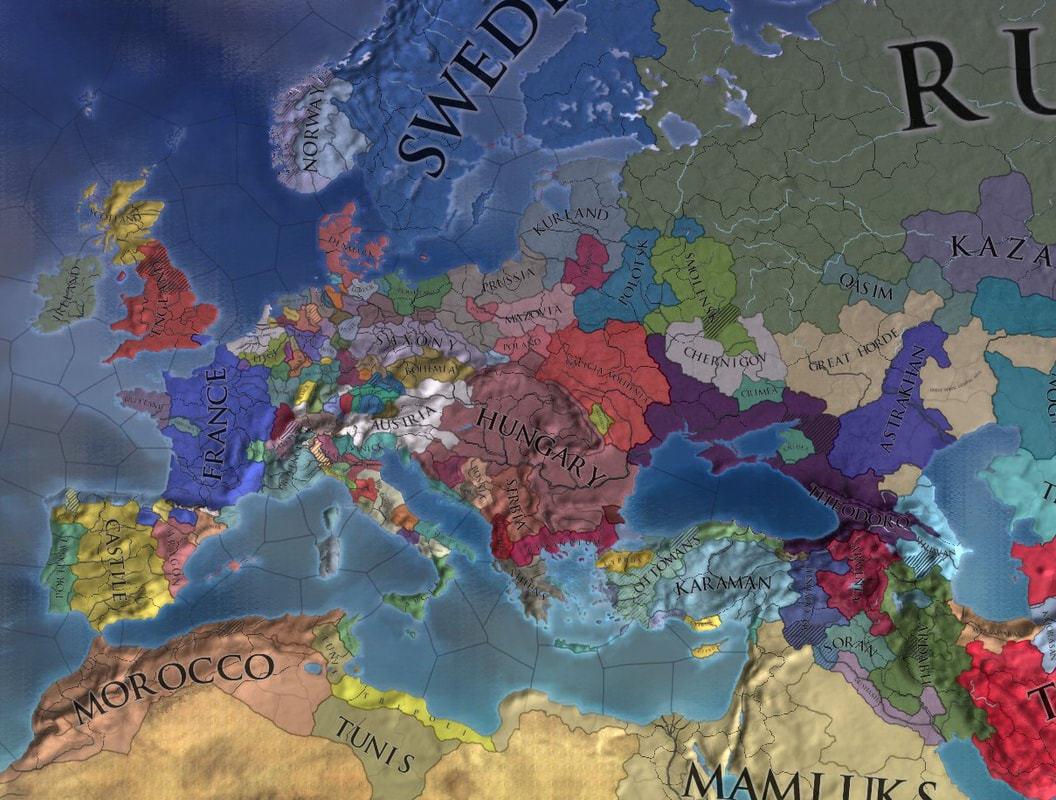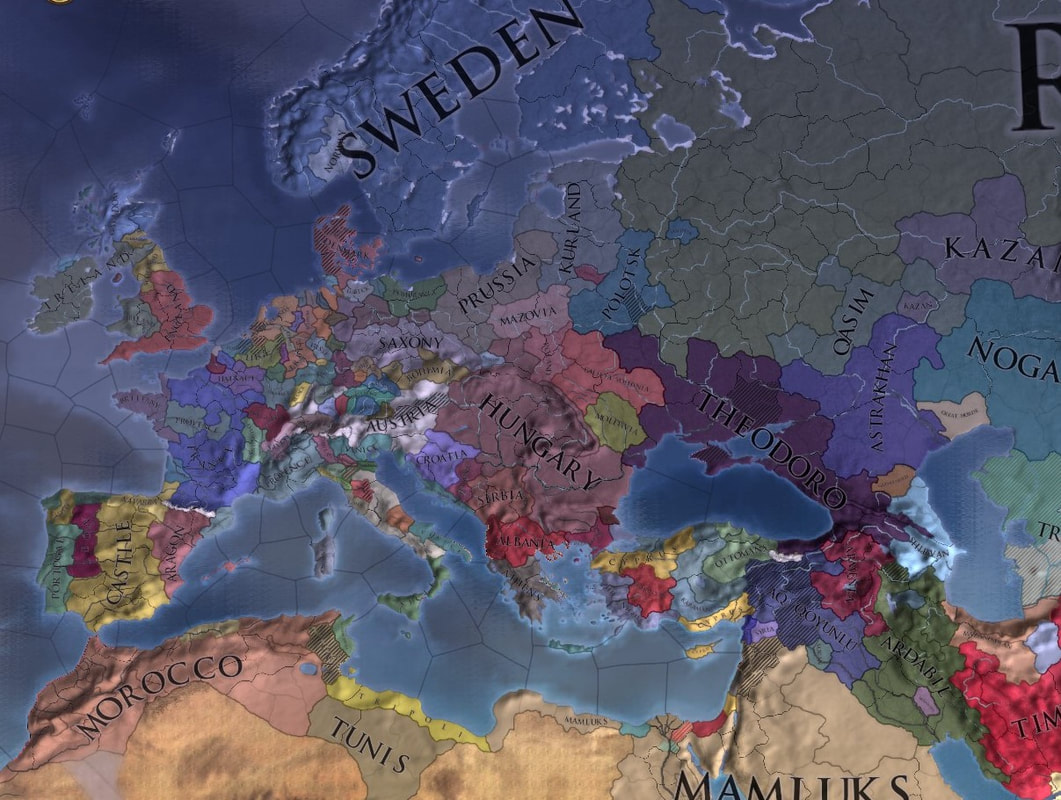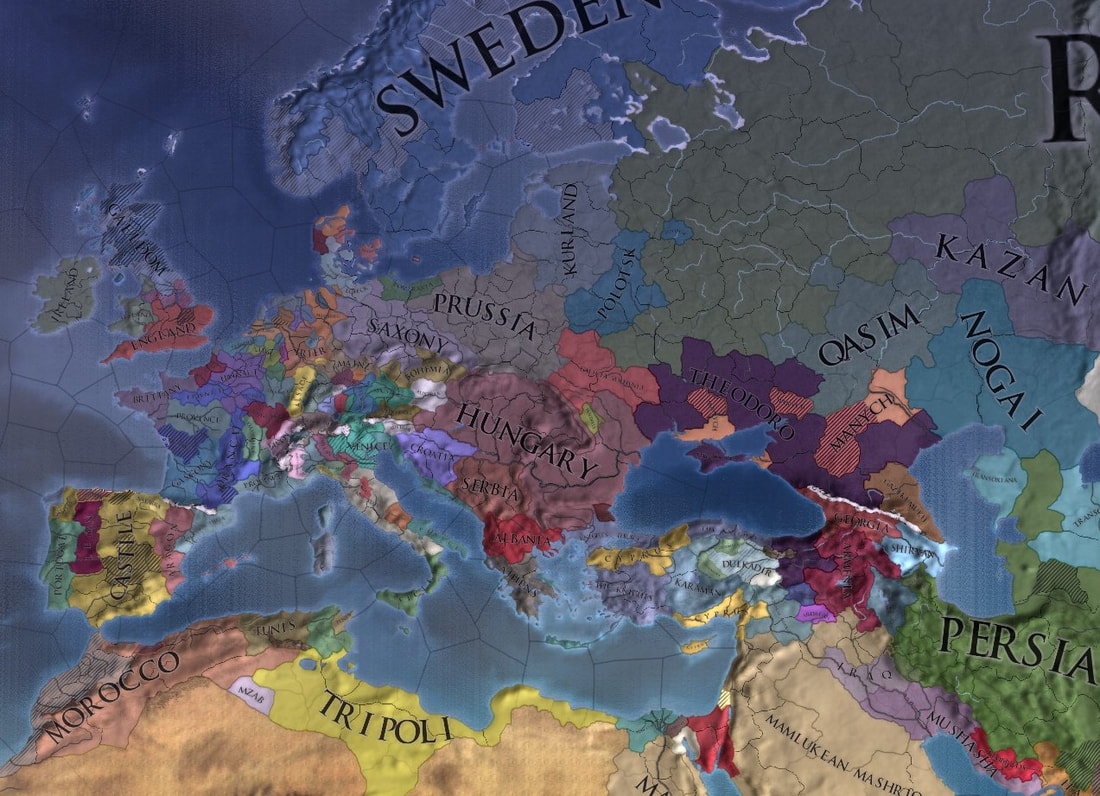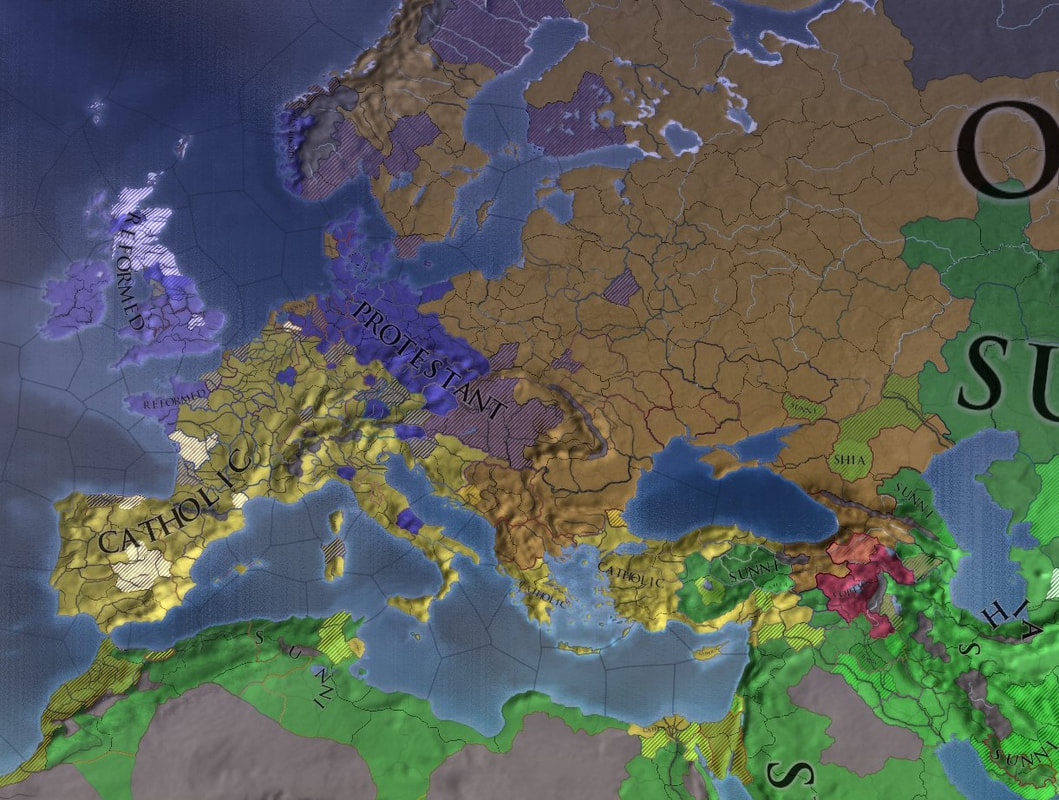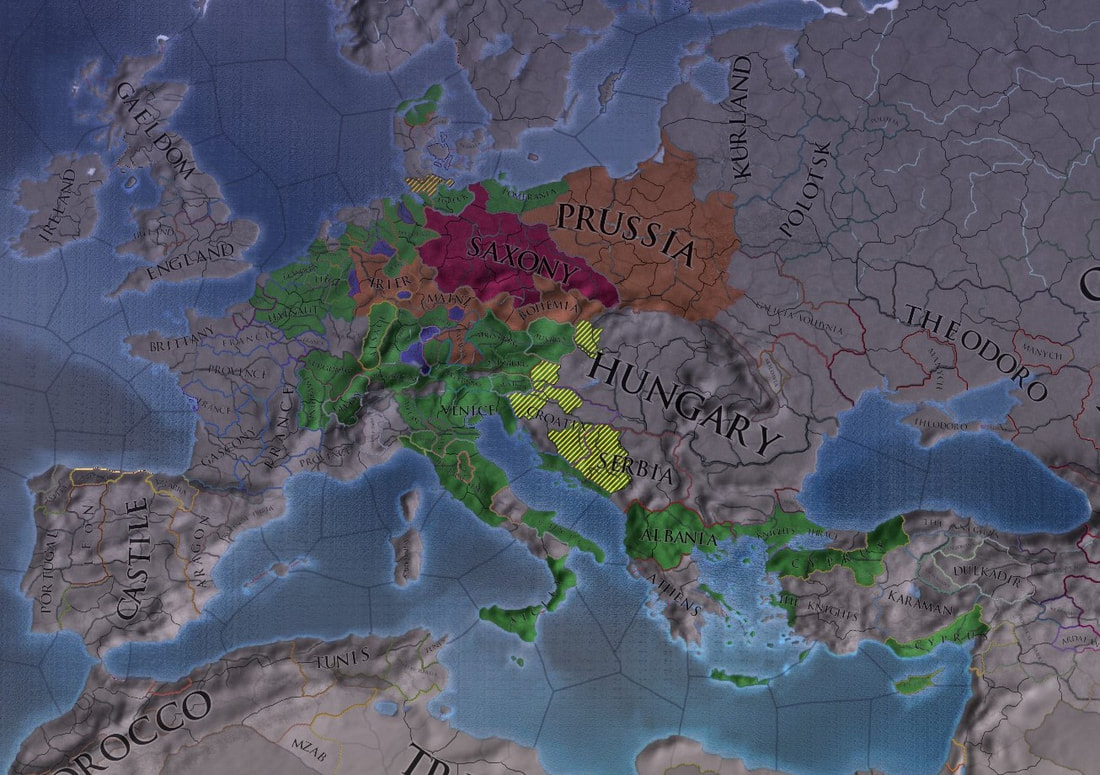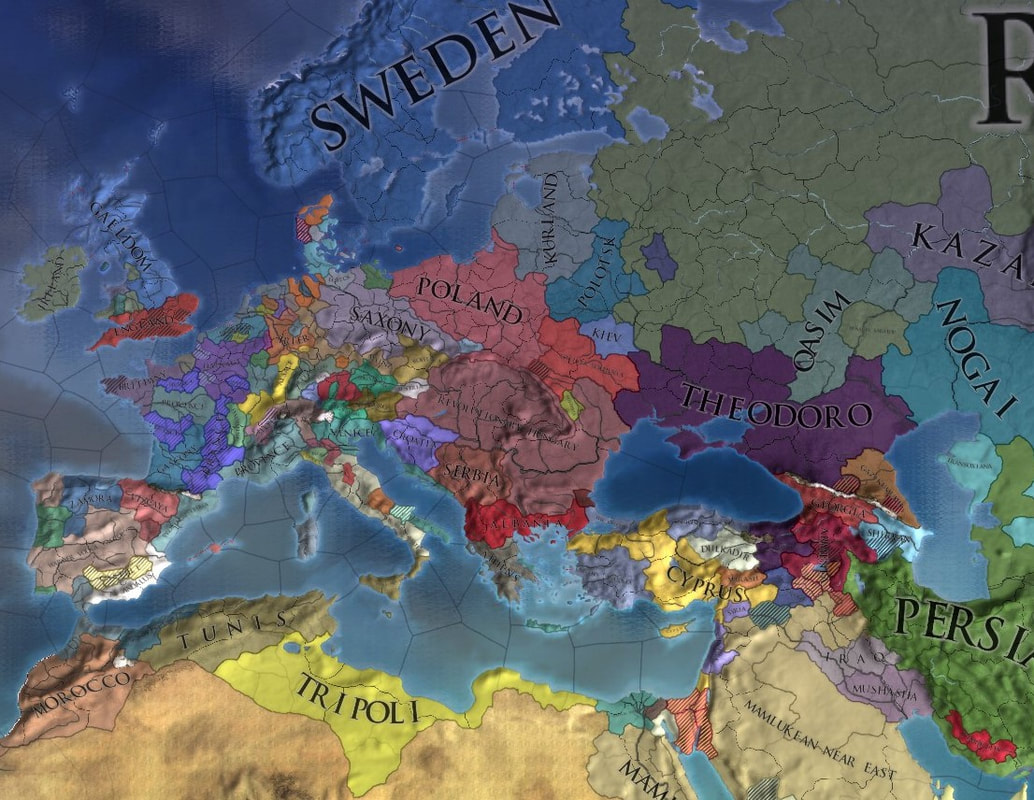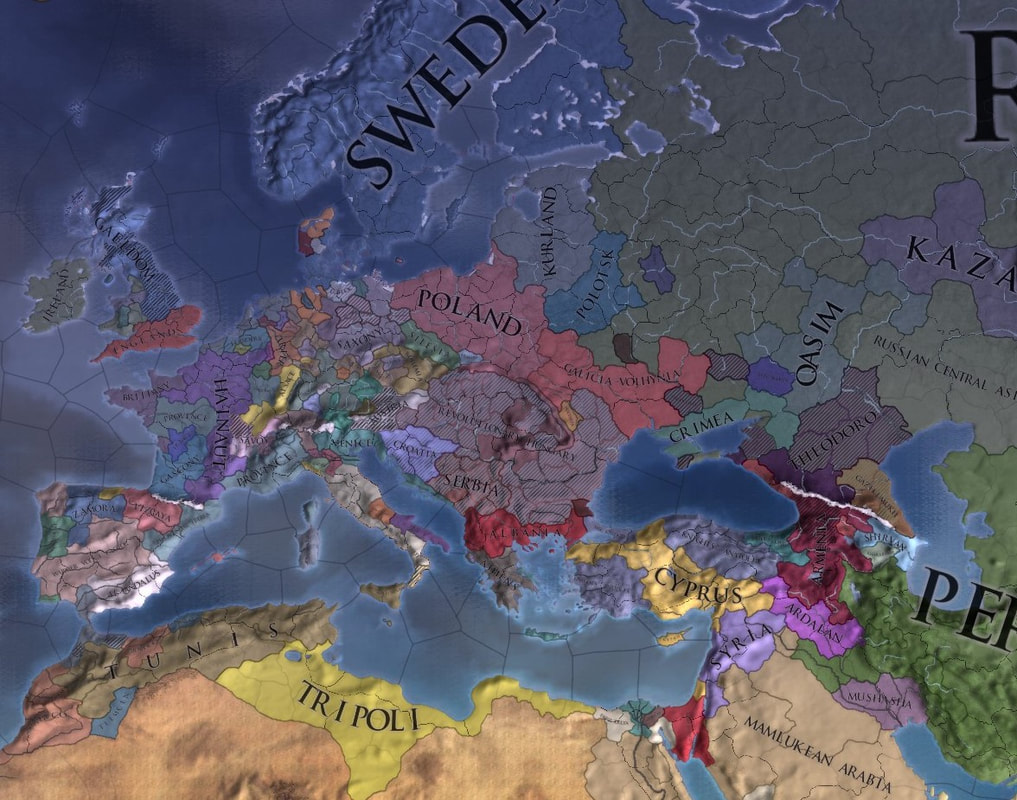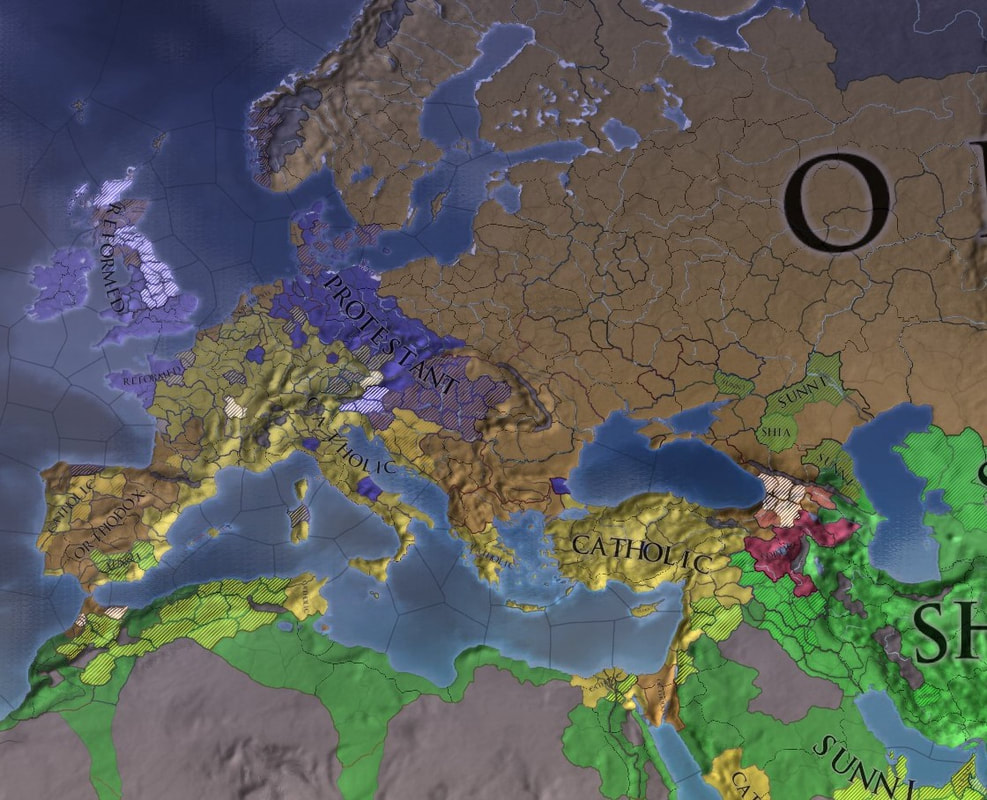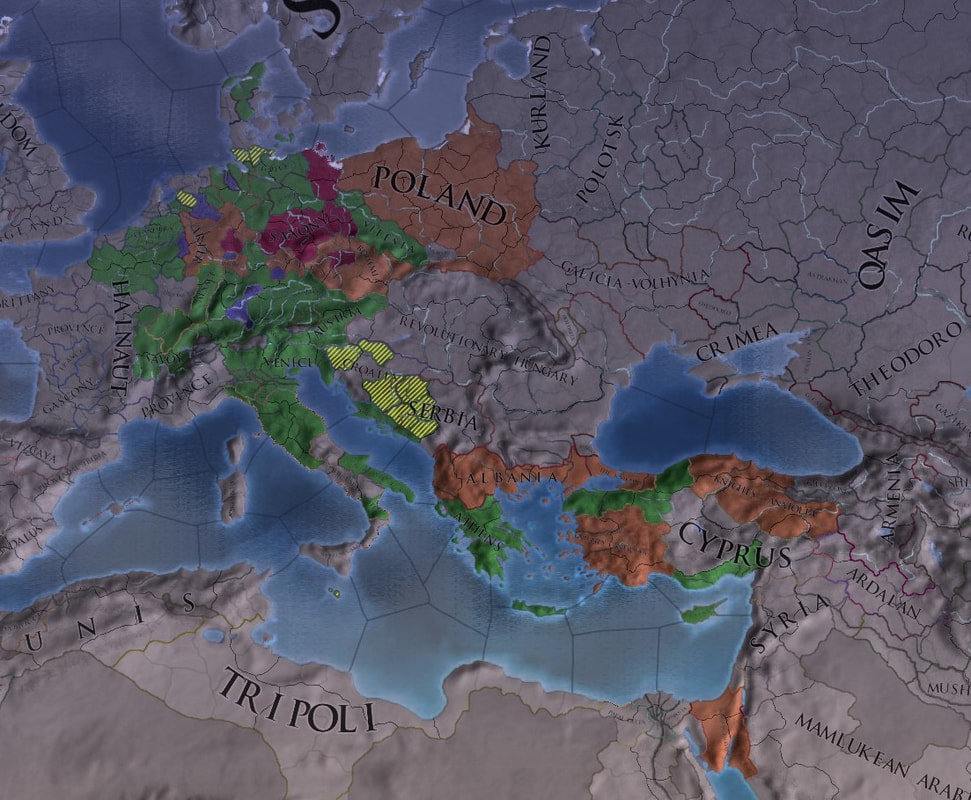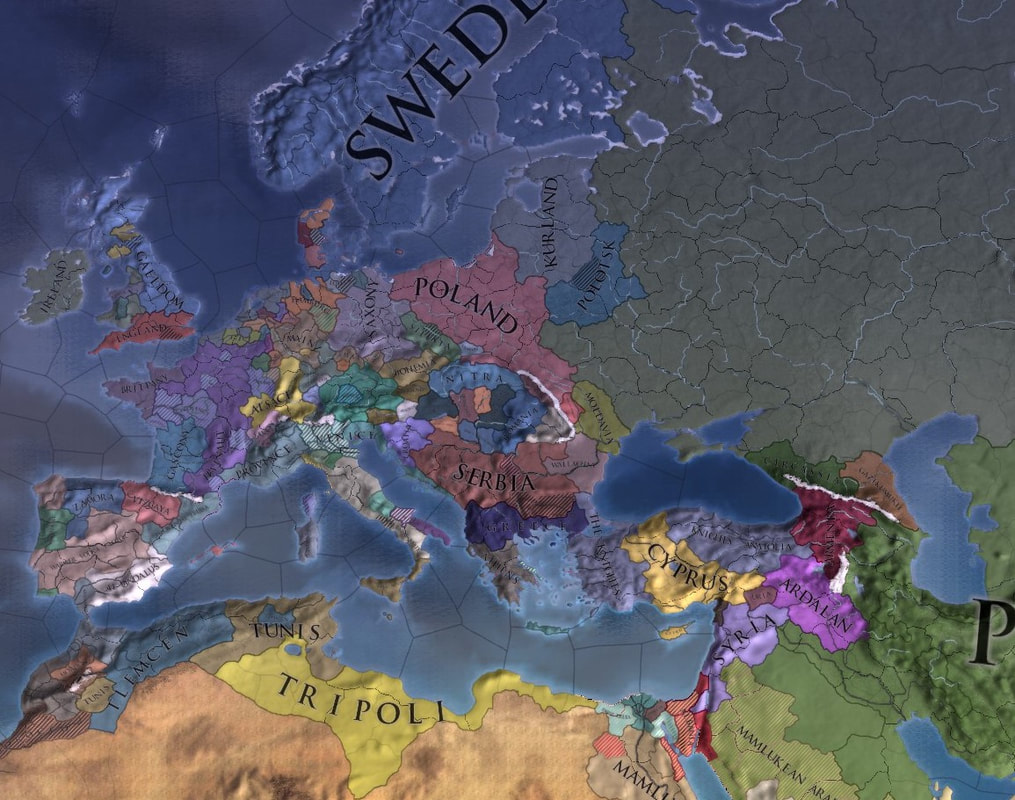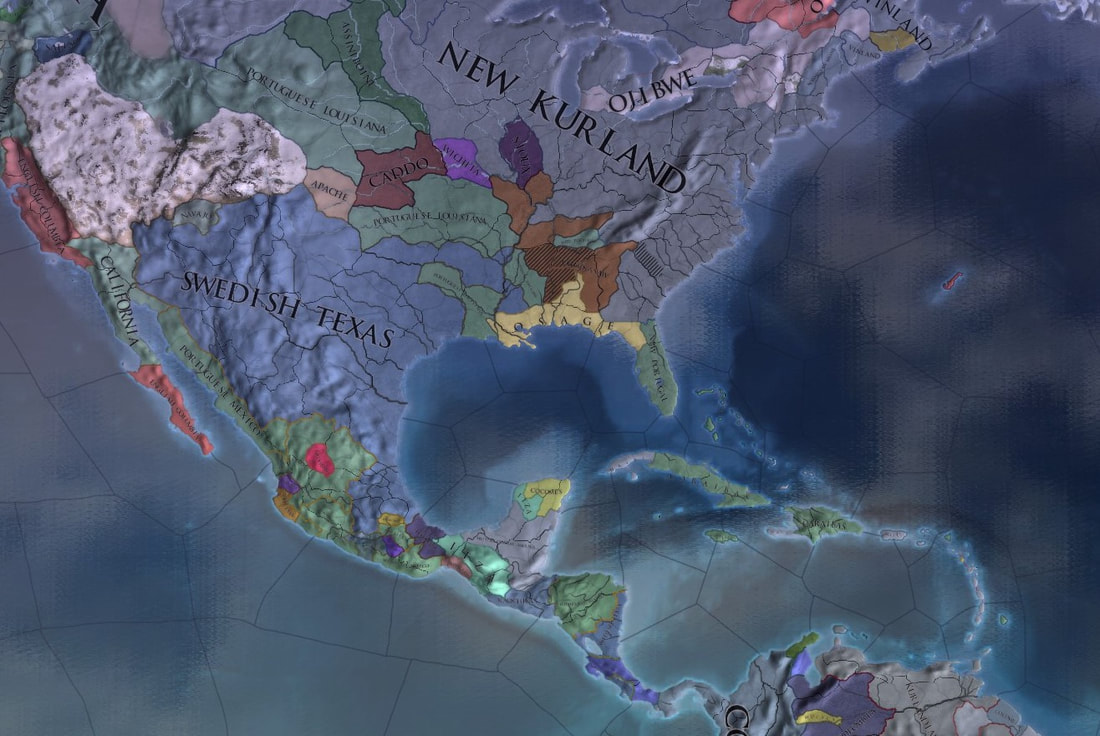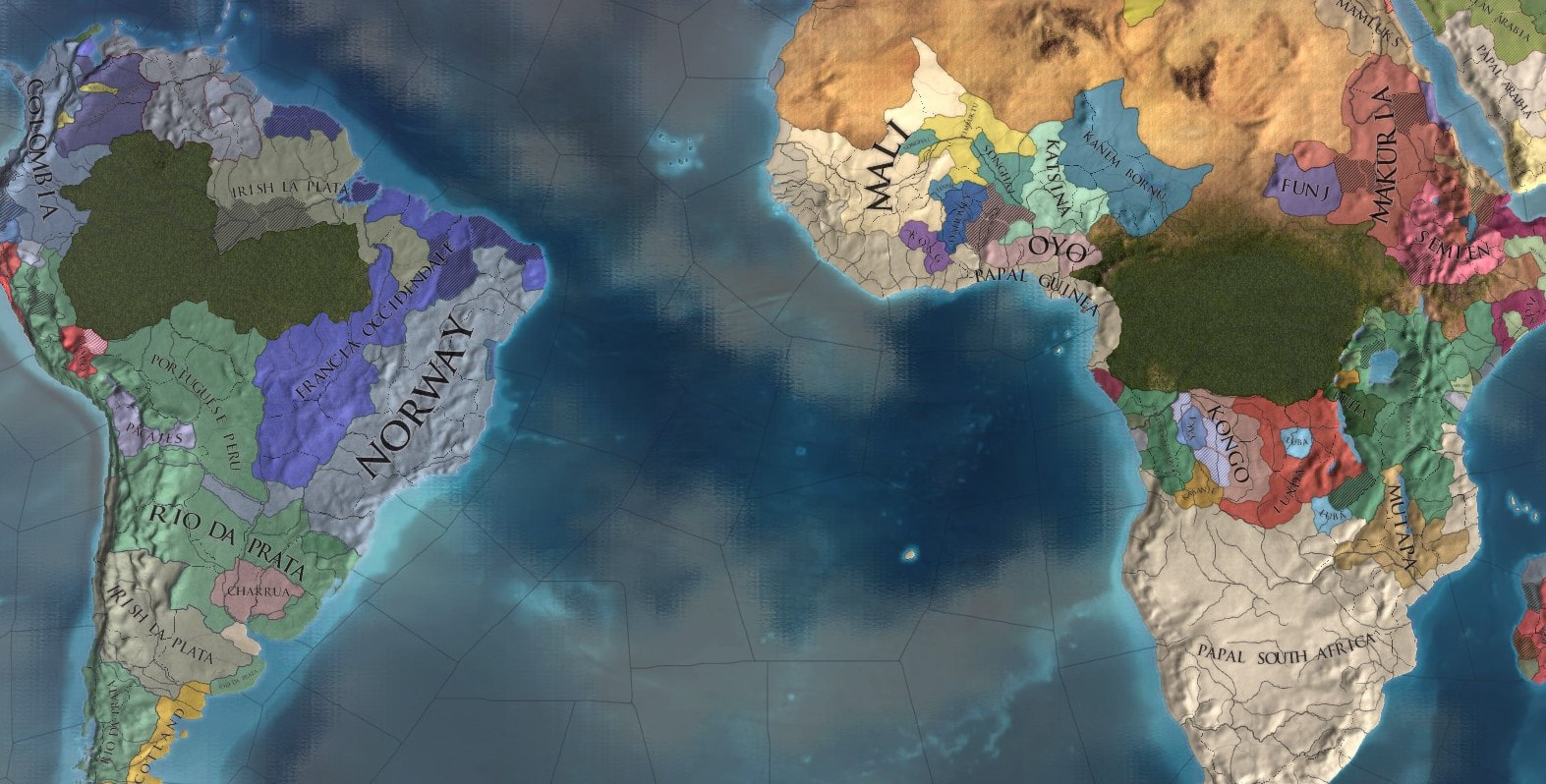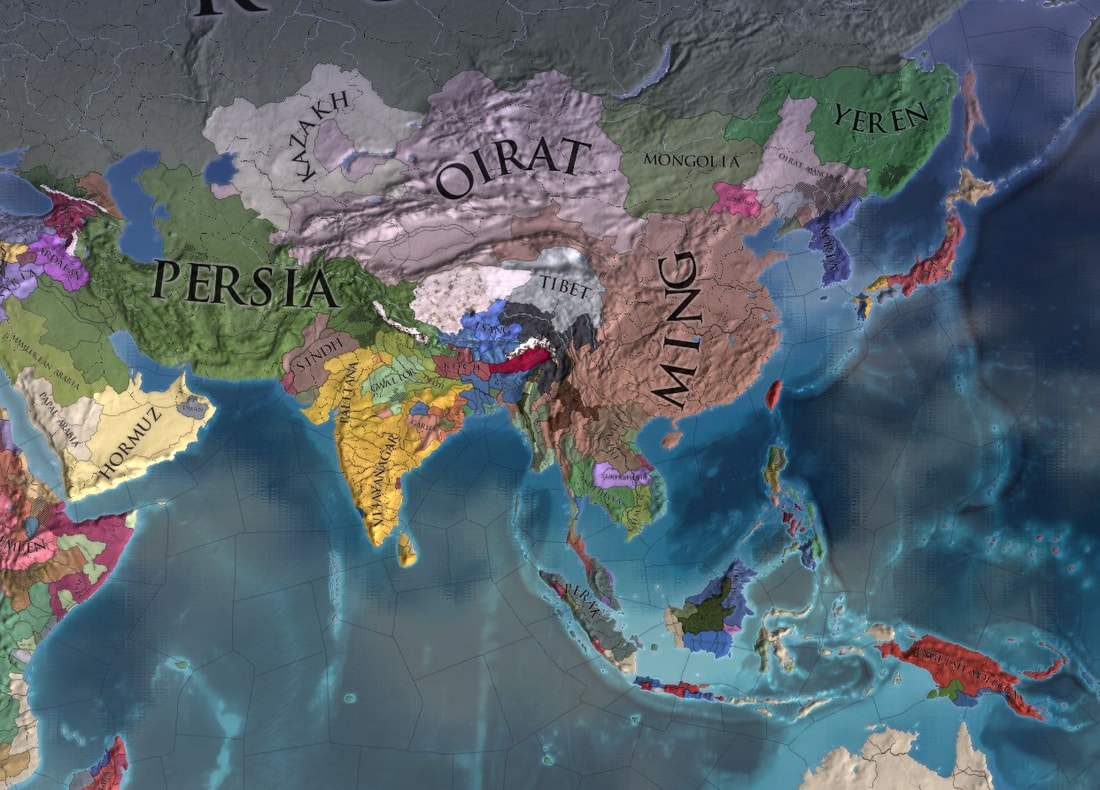The Last Crusade - Starting Conditions
|
Nation Selection on Friday, 20 September 2019, 8:00 EST
in Gametactica Discord |
Final Rankings - Prestige
|
Tier 1 - The New Crusade
"The Last Crusader" Iron/Brian T - Bishopric of the Hospitallers - 21 Jeudy/Jordan - Beylik of Cyprus - 15 Chaching/Eric - Kingdom of Provence - 14 Jiokuy - Papal States - 13 Mr. Scruff/Brad - Republic of Venice - 12 Pixel - Republic of Athens - 11 William - Kingdom of Tunis - 10 MoneyMaker/Braxton - Princedom of Albania - 9 |
Tier 2 - The Empty Throne
"The Kingmaker" Oriemaster/Wyatt T - G. Republic of Poland - 13 MissingNo/Weston - Tsardom of Russia - 7 Blyatt/Wyatt L - Empire of Kurland - 6 Dirty Morded/Brian S - Kingdom of Saxony - 5 Parafrost - Kingdom of Sweden - 4 Inevitable/Syth - Republic of French Brazil - 1 Cap. Dickers/Josh - Empire of Hungary - 1 Jack Harvey - Metropolis of Crimea - 1 |
The Last Crusade has defined much of Europe's politics at 1444, permitting the Ottomans to continue their expansion, signalling the vulnerability of a fractured Catholic world, and leaving a lack of leadership to pick up the pieces after the chaos of war. In Eastern Europe the kingdom of Poland, even after forming the Commonwealth of Poland and Lithuania, would act as a uniquely powerful pawn in the struggles between its neighbors after its king's death without an heir at the Battle of Varna. Lacking a strong monarchy, and possessing a strong nobility most interested in continuing to lack a strong monarchy, the throne of the kingdom would be controlled by families from all across Europe at different times with drastic effects in the region. Poland's neighbors would either fight for the kingdom's control in the throneroom, or fight for its neglected holdings on the battlefield.
But other visionaries say that this need not always be the legacy of the Last Crusade. Christian power in the Holy Land is now negligible, but this was also the case before the First Crusade. With the news of Varna passing through the rest of Europe, the Holy Father may consider one final effort coordinated by those descended from the successful Crusaders of the past. For the Last Crusade must ultimately be one that will establish the Kingdom of Jerusalem and glorify the Catholic faith in its darkest hour. However, the unfaithful leaders of Europe's greatest powers have eyes only for their own borders at home and show only apathy towards Rome. This great task will be left only to a few unlikely remnants of Crusader power.
But other visionaries say that this need not always be the legacy of the Last Crusade. Christian power in the Holy Land is now negligible, but this was also the case before the First Crusade. With the news of Varna passing through the rest of Europe, the Holy Father may consider one final effort coordinated by those descended from the successful Crusaders of the past. For the Last Crusade must ultimately be one that will establish the Kingdom of Jerusalem and glorify the Catholic faith in its darkest hour. However, the unfaithful leaders of Europe's greatest powers have eyes only for their own borders at home and show only apathy towards Rome. This great task will be left only to a few unlikely remnants of Crusader power.
Scoring Rules
Scoring - Victory Cards and Tier Objectives
In-game points will be ignored for this campaign. Instead, players may accumulate points as described below.
Ages and Scoring - Most scoring is counted at the end of each Age, giving four opportunities for players to gain most of their score. Achieving these objectives is only counted at the end of the age, and will not count for any score if lost the day before the Age ends. Unless otherwise stated, such as with Victory Cards, the number of the Age is multiplied to these scores, meaning objectives become much more valuable over time. Score can also be gained in some ways that are immediate and any immediate score will generally be multiplied by the number of the Age it takes place during (Discovery - x1, Reformation - x2, Absolutism - x3, Revolution - x4).
Advice: Treachery works best when executed close to the end of an Age, giving others little chance to retaliate before score is counted, but it can also be difficult to quickly pry away an objective from another player. Generally it is more reliable to obtain objectives as early as possible and defend them, rather than steal them. On the other hand, securing objectives early and aggressively can set the field against you in the campaign's early diplomacy. Waiting until the late game to make decisive moves can pay off, as the Age multiplier can quickly catapult a player into the lead as long as previous leaders are deprived of their own sources of score.
Tiers - In order to allow players some choice in competitiveness and difficulty, the nations are placed in tiers that share most of their scoring objectives. A player cannot gain score from objectives from other tiers than their own. Players in Tier 1 will always place before players in Tier 2 in final rankings for the purpose of prestige and future nation selection, no matter the score. In other words, the highest score in Tier 2 will rank directly behind the lowest score in Tier 1 as long as the player finishes the game. This is to ensure that players who wish to challenge themselves with difficult starts and competitive opponents are not unduly punished for a tough campaign. The winner (highest score) from each tier, however, will win +5 to their Gametactica prestige and a Paradox DLC of their choice.
Advice: Allies from other tiers will likely be more reliable than allies from your own tier, since you should not need to directly compete over objectives or ranking. However, allies from other tiers are also less likely to be focused on similar goals.
Victory Cards - The arbitrary demands of your people. Victory cards will only be scored at the end of each age. At the end of each age, players will gain an amount of points equal to the in-game value of each victory card owned (1000, 2000, 3000, or 4000) and half this value will be subtracted from any other players that once held the province (this will be determined by the in-game related malus, and can affect players outside of your tier). As usual for ownership related objectives, occupation will be ignored for this determination. Note that subjects cannot capture Victory Cards for their overlords. Victory Card score values are already scaled and are not multiplied by the Age.
Advice: Victory Cards will normally appear on nations of similar strength that you share a border with, and will prioritize nations that you have an alliance with first and a rivalry with second. Be wary of having allies that you share borders with, or you will be forced to turn on them or ignore a large scoring opportunity. Since Victory Cards also impose a negative score on those they are taken from, all players are advised to help other players take Victory Cards on the lands of the leading scorers even if they do not benefit directly.
Tier 1 Objectives - Ambitions of the Final Crusade
The new crusader states can gain score by capturing the strongholds of the old Crusader States and previous Crusade targets, with Jerusalem worth twice as much as any other target. Each objective's value is doubled if that province is also the capital of the player's nation or one of its vassals.
Jerusalem - 1000
Antioch - 500
Acre - 500
Alexandria - 500
Constantinople - 500
(x2 if capital)
Controlling as many cardinals as possible will also gain score for Tier 1, including those controlled by subjects.
Each Cardinal - 250
Tier 1 players can score immediately each time their own nation gains control of the Catholic Curia.
Each Curia Election Win - 1000
Advice: The province objectives have a real chance of being unavailable to the players if the players fail to work together to defeat the Mamluks and/or the Ottomans, relegating the tier to only being able to compete over control of the Curia. In fact, a player who is successfully controlling the Curia, or one who has successfully obtained one of the remote objectives of Alexandria or Constantinople, may not see fighting for the Holy Land to be in their interest at all. Any player that is able to grab Jerusalem, and make it a vassal's or their own capital province, will quickly eclipse the other players in score.
Tier 2 Objectives - Shadows of the Last Crusade
In Tier 2, players can gain score from taking advantage of the kingdom's vulnerable state through war by having influence over the key cities of the new Commonwealth. A nation can only gain score for directly holding these provinces if their Primary Culture is one of the Commonwealth Cultures: Polish, Lithuanian, Byelorussian, Ryazanian, or Ruthenian. However, any AI nation that holds scoring provinces and meets the Culture requirement will grant the corresponding score to all Tier 2 players that have them as an Ally, Vassal, Personal Union, or Tributary. Great Powers in Tier 2 may ally any AI nation who has a Commonwealth Culture as their Primary Culture. The value of any scoring province is doubled if it is the capital of a nation.
Warsaw - 1000
Krakow - 500
Vilinus - 500
Kiev - 500
Smolensk - 500
As a further bonus for diplomatic relations with Poland or the Commonwealth, Tier 2 players will score each time a member of their dynasty is elected or inherits the Polish throne as long as Poland or the Commonwealth holds at least one of the Tier 2 objective provinces. Note that this is not possible if the country has no ruling dynasty such as in most republics.
Succession to Polish throne - 1000
Advice: Players may find themselves in two camps in this tier, as some players will likely find it impossible to secure an alliance with Poland and therefore hope for the kingdom's fall while the others might support the kingdom. Fighting alongside the Poles is the surest path to victory, but taking the Commonwealth's land for yourself will also exclude others from gaining score even though the respective player can only gain the score himself if he switches primary cultures. Other ways of controlling the score that might become viable are gaining a Personal Union over the Poles (typically by event if your dynasty sits on the Polish throne), creating and protecting vassals that meet the culture requirement, or destroying the kingdom and reforming it yourself.
*Unless otherwise stated, objectives that are specific provinces can be scored by directly owning them or by controlling them through a non-tributary subject. If the subject is a another player and both player's are capable of gaining score from that objective, the overlord decides who will gain the score.
*Unless otherwise stated, reference to subjects excludes Tributaries.
In-game points will be ignored for this campaign. Instead, players may accumulate points as described below.
Ages and Scoring - Most scoring is counted at the end of each Age, giving four opportunities for players to gain most of their score. Achieving these objectives is only counted at the end of the age, and will not count for any score if lost the day before the Age ends. Unless otherwise stated, such as with Victory Cards, the number of the Age is multiplied to these scores, meaning objectives become much more valuable over time. Score can also be gained in some ways that are immediate and any immediate score will generally be multiplied by the number of the Age it takes place during (Discovery - x1, Reformation - x2, Absolutism - x3, Revolution - x4).
Advice: Treachery works best when executed close to the end of an Age, giving others little chance to retaliate before score is counted, but it can also be difficult to quickly pry away an objective from another player. Generally it is more reliable to obtain objectives as early as possible and defend them, rather than steal them. On the other hand, securing objectives early and aggressively can set the field against you in the campaign's early diplomacy. Waiting until the late game to make decisive moves can pay off, as the Age multiplier can quickly catapult a player into the lead as long as previous leaders are deprived of their own sources of score.
Tiers - In order to allow players some choice in competitiveness and difficulty, the nations are placed in tiers that share most of their scoring objectives. A player cannot gain score from objectives from other tiers than their own. Players in Tier 1 will always place before players in Tier 2 in final rankings for the purpose of prestige and future nation selection, no matter the score. In other words, the highest score in Tier 2 will rank directly behind the lowest score in Tier 1 as long as the player finishes the game. This is to ensure that players who wish to challenge themselves with difficult starts and competitive opponents are not unduly punished for a tough campaign. The winner (highest score) from each tier, however, will win +5 to their Gametactica prestige and a Paradox DLC of their choice.
Advice: Allies from other tiers will likely be more reliable than allies from your own tier, since you should not need to directly compete over objectives or ranking. However, allies from other tiers are also less likely to be focused on similar goals.
Victory Cards - The arbitrary demands of your people. Victory cards will only be scored at the end of each age. At the end of each age, players will gain an amount of points equal to the in-game value of each victory card owned (1000, 2000, 3000, or 4000) and half this value will be subtracted from any other players that once held the province (this will be determined by the in-game related malus, and can affect players outside of your tier). As usual for ownership related objectives, occupation will be ignored for this determination. Note that subjects cannot capture Victory Cards for their overlords. Victory Card score values are already scaled and are not multiplied by the Age.
Advice: Victory Cards will normally appear on nations of similar strength that you share a border with, and will prioritize nations that you have an alliance with first and a rivalry with second. Be wary of having allies that you share borders with, or you will be forced to turn on them or ignore a large scoring opportunity. Since Victory Cards also impose a negative score on those they are taken from, all players are advised to help other players take Victory Cards on the lands of the leading scorers even if they do not benefit directly.
Tier 1 Objectives - Ambitions of the Final Crusade
The new crusader states can gain score by capturing the strongholds of the old Crusader States and previous Crusade targets, with Jerusalem worth twice as much as any other target. Each objective's value is doubled if that province is also the capital of the player's nation or one of its vassals.
Jerusalem - 1000
Antioch - 500
Acre - 500
Alexandria - 500
Constantinople - 500
(x2 if capital)
Controlling as many cardinals as possible will also gain score for Tier 1, including those controlled by subjects.
Each Cardinal - 250
Tier 1 players can score immediately each time their own nation gains control of the Catholic Curia.
Each Curia Election Win - 1000
Advice: The province objectives have a real chance of being unavailable to the players if the players fail to work together to defeat the Mamluks and/or the Ottomans, relegating the tier to only being able to compete over control of the Curia. In fact, a player who is successfully controlling the Curia, or one who has successfully obtained one of the remote objectives of Alexandria or Constantinople, may not see fighting for the Holy Land to be in their interest at all. Any player that is able to grab Jerusalem, and make it a vassal's or their own capital province, will quickly eclipse the other players in score.
Tier 2 Objectives - Shadows of the Last Crusade
In Tier 2, players can gain score from taking advantage of the kingdom's vulnerable state through war by having influence over the key cities of the new Commonwealth. A nation can only gain score for directly holding these provinces if their Primary Culture is one of the Commonwealth Cultures: Polish, Lithuanian, Byelorussian, Ryazanian, or Ruthenian. However, any AI nation that holds scoring provinces and meets the Culture requirement will grant the corresponding score to all Tier 2 players that have them as an Ally, Vassal, Personal Union, or Tributary. Great Powers in Tier 2 may ally any AI nation who has a Commonwealth Culture as their Primary Culture. The value of any scoring province is doubled if it is the capital of a nation.
Warsaw - 1000
Krakow - 500
Vilinus - 500
Kiev - 500
Smolensk - 500
As a further bonus for diplomatic relations with Poland or the Commonwealth, Tier 2 players will score each time a member of their dynasty is elected or inherits the Polish throne as long as Poland or the Commonwealth holds at least one of the Tier 2 objective provinces. Note that this is not possible if the country has no ruling dynasty such as in most republics.
Succession to Polish throne - 1000
Advice: Players may find themselves in two camps in this tier, as some players will likely find it impossible to secure an alliance with Poland and therefore hope for the kingdom's fall while the others might support the kingdom. Fighting alongside the Poles is the surest path to victory, but taking the Commonwealth's land for yourself will also exclude others from gaining score even though the respective player can only gain the score himself if he switches primary cultures. Other ways of controlling the score that might become viable are gaining a Personal Union over the Poles (typically by event if your dynasty sits on the Polish throne), creating and protecting vassals that meet the culture requirement, or destroying the kingdom and reforming it yourself.
*Unless otherwise stated, objectives that are specific provinces can be scored by directly owning them or by controlling them through a non-tributary subject. If the subject is a another player and both player's are capable of gaining score from that objective, the overlord decides who will gain the score.
*Unless otherwise stated, reference to subjects excludes Tributaries.
Rewards
Tier 1 - "The Last Crusader" - Any Paradox DLC <$20
Tier 2 - "The Kingmaker" - Any Paradox DLC <$10
- Prestige!
- Nation selection in a future campaign will go in order of tier participation, followed by final score ranking in this campaign, except players who received prizes will pick last (in order of final score). In effect, this will mean all players from tier 1, except the tier's winner, will pick first in order of score, followed by all players from tier 2, except the tier's winner, in order of score, etc...
Other Campaign Rules
1. Diplomacy Campaign Rules - Rules to frustrate our most successful players
- Players who are Great Powers may not have any alliances, and must break all alliances immediately upon becoming a Great Power. They may utilize Guarantee, Enforce Peace, Intervene in War, and all other diplomatic options as normal.
2. The 30% Treaty Rule - To encourage riskier and shorter wars
In order to encourage more frequent, shorter wars that do not devolve into world-spanning conflicts, we will be using the 30% Rule in this campaign. At any point in a war that the primary aggressor/defender has 30% or more war-score, they may send a peace treaty demanding a white peace or the annexation of one province that they occupy, that is owned by the primary defender/aggressor, and that they share a border with by land or sea, and this peace treaty cannot be refused. To be unrefusable, the treaty must contain no other conditions except a white peace or the annexation of the single province and the province must not be a nation's capital. The sending player may pause the game for this treaty, so that the war-score will not change and the rule can be enforced. For this rule, provinces owned or occupied by non-tributary subjects count as being owned or occupied by their overlord.
3. Home Area Protection - Protection rules to maintain a minimal power base of every player.
Players may not ever annex any province in the area of another player's starting capital. Players may directly cause the annexation of any of the provinces owned by another player in the area of that player's starting capital in any treaty they control, nor can they return a province or cause the release of a nation that would release a province from a player's capital area in any treaty they control. Players may vassalize or otherwise subjugate a player or other nation in a Home Area, but may not diplomatically annex the player or other AI nation that is part of a player's Home Area. A player's protected area will never change and does not move if a player moves his capital by choice, national decision, or switching to a subject nation. Should a player change nations or fail to return to the game, the starting area of the player's abandoned nation will remain protected in this way and will never be available for annexation. If this rule is accidentally violated, the province must be given back to its rightful owner at no cost as soon as possible. If it is purposely violated, the offending player will be kicked.
4. Endless Player Restart - Protection rules to maintain a minimal power base of every player.
If a player is eliminated by the AI, his starting capital, and all provinces in his capital's area that still have cores of his nation, will be released at the start of the next session as a vassal of the nation that now owns his starting capital province.
5. One-Time Absence Protection - Protection rules to maintain a minimal power base of every player.
During a missed session, a player may invoke protection for their nation one time. Other players may not attack a protected nation, and may not demand any peace terms from their nation if they find themselves at war by other means. Otherwise absent players' nations are not protected in missed sessions and players cannot take advantage of protection after the year 1750 regardless. If a war continues into a player's protected session, his enemies may not demand the ceding/release of land they did not occupy at the start of the protected session, or release nations that do not entirely exist within land they occupied at the start of the protected session, but other treaty terms that have no direct effect on province ownership are allowed in this situation. This protection is ignored in any wars initiated by the protected nation that target another player, so players are responsible for ensuring their nation is passive during their absence in their AI settings. Please inform one of the game hosts anytime before the start of a session if you will be absent and would like to use your protection. Protection may be used if arriving late but not for departing early.
6. Switching to a Subject Nation
A player may use the vassal release mechanic or colonial nation release mechanic to switch to playing another nation. Protected Areas in the campaign will not be changed.
7. Nation Selection
Selection Order - Nation selection in this campaign will draw from the final rankings of the Third Rome campaign (using the previous rewards description). Excluding the winners of each tier (who will be selecting last), all players returning from the Third Rome campaign will be able to to select nations in order of their final ranking descending from top score to lowest score, followed by any new players in a randomly determined order, followed by the winners of each tier in order of final ranking. A player who has played in earlier campaigns but did not participate in Third Rome will be allowed to use the final ranking of their latest campaign to determine their selection placement, and will be placed directly behind the player of equivalent ranking from Third Rome. Any players who missed more than 50% of sessions in their last campaign will not pick according to score and will be placed at the end of the selection order in a random ranking determined by d100. A roll of 80 or higher will also place them before the 'winners' group', just to make things a bit less predictable.
Tiers - Please remember to choose a tier that reflects the challenge and intensity that you wish to experience. While you will interact and compete for the same resources with all other players, your score will only be compared to players from within your own tier. Tier 1 is rewarded with first choice from the (undisclosed) prize pool (winner only) and earliest choices in nation selection in the next campaign (according to the latest "rewards" update seen below), and is intended for players seeking difficult starts, intense diplomacy and intrigue, and experienced competition. Tier 4 is intended for players seeking more secure starts, more room to learn, more leniency for absences, and a fair amount of cooperation alongside their competition, but will have later placement for the next nation selection and its winner gets last selection from the prize pool. With four tiers, it is hoped that each player will be given some chance to customize their game experience.
Imbalance - Obviously, even within tiers, the nation choices are imbalanced in strength, making earlier selection positions very valuable for grabbing the "best" nations in any one tier. The choices available have been selected to allow each player good opportunities to use diplomacy and intrigue to compensate for any lacking in raw military or economic might. Any viewing of the previous campaign final rankings should be sufficient evidence to support the fact that starting nation strength does not predict final ranking.
Secret Nations - Once any tier has had all nations claimed, one or more additional secret nations will become available for that tier, with possibly drastic changes to that tier's balance of power. Yes, this means that these secret nations will be impossible to pick by those with the earliest picks. These new nations could be of major or insignificant power, may not appear at all if a tier is left unfinished, and will likely be great sources of hope and disappointment for those stuck with the last picks. The campaign designer(s) is not permitted to select one of these secret nations if any other choice is available.
8. Discord War Camps - Public channels for private coordination
Please do not enter occupied War Camp channels unless invited by an occupant. These channels are available for both plotting in peacetime and coordination during wartime. Refusing to respect War Camp privacy will lead to being kicked from the Discord.
9. Shared Bloodlines - Mentoring
In order to mitigate the steep learning curve of EU4 for new players and to prevent the worst forms of manipulation, it is helpful to have at least one player that any newer player can know is a trustworthy source of advice. Towards that end, two players may agree to play in a Shared Bloodlines format in this campaign, conferring the below unique mechanics:
- Both players will choose their nation together, at the earliest selection position of the two players.
- The players must choose two nations in different Tiers. The player in the higher tier will be considered the "Mentor".
- The Mentor's nation selection must own 10 provinces or less and the Mentor may never exceed ownership of more than 10 provinces throughout the course of the campaign. Ownership for this purpose will include all Personal Unions, due to their inheritance mechanics, but excludes Vassals, Colonial Nations, and provinces assigned to a Trade Company. Willful violation of this rule will cause the independent release of all foreign cores within the Mentor's nation and all subjects at the end of the session. Violation of this rule outside of the Mentor's control must be immediately rectified by province release in-game.
- All score from Victory Cards and the specific provinces designated as Age Objectives will be combined from both players and split evenly between them. Other objectives will not be split due to possible improportionalities between Tier scoring systems.
- Any victory cards from either nation that fall on land that would penalize their partner will be rerolled.
- Players who are Great Powers may not have any alliances, and must break all alliances immediately upon becoming a Great Power. They may utilize Guarantee, Enforce Peace, Intervene in War, and all other diplomatic options as normal.
2. The 30% Treaty Rule - To encourage riskier and shorter wars
In order to encourage more frequent, shorter wars that do not devolve into world-spanning conflicts, we will be using the 30% Rule in this campaign. At any point in a war that the primary aggressor/defender has 30% or more war-score, they may send a peace treaty demanding a white peace or the annexation of one province that they occupy, that is owned by the primary defender/aggressor, and that they share a border with by land or sea, and this peace treaty cannot be refused. To be unrefusable, the treaty must contain no other conditions except a white peace or the annexation of the single province and the province must not be a nation's capital. The sending player may pause the game for this treaty, so that the war-score will not change and the rule can be enforced. For this rule, provinces owned or occupied by non-tributary subjects count as being owned or occupied by their overlord.
3. Home Area Protection - Protection rules to maintain a minimal power base of every player.
Players may not ever annex any province in the area of another player's starting capital. Players may directly cause the annexation of any of the provinces owned by another player in the area of that player's starting capital in any treaty they control, nor can they return a province or cause the release of a nation that would release a province from a player's capital area in any treaty they control. Players may vassalize or otherwise subjugate a player or other nation in a Home Area, but may not diplomatically annex the player or other AI nation that is part of a player's Home Area. A player's protected area will never change and does not move if a player moves his capital by choice, national decision, or switching to a subject nation. Should a player change nations or fail to return to the game, the starting area of the player's abandoned nation will remain protected in this way and will never be available for annexation. If this rule is accidentally violated, the province must be given back to its rightful owner at no cost as soon as possible. If it is purposely violated, the offending player will be kicked.
4. Endless Player Restart - Protection rules to maintain a minimal power base of every player.
If a player is eliminated by the AI, his starting capital, and all provinces in his capital's area that still have cores of his nation, will be released at the start of the next session as a vassal of the nation that now owns his starting capital province.
5. One-Time Absence Protection - Protection rules to maintain a minimal power base of every player.
During a missed session, a player may invoke protection for their nation one time. Other players may not attack a protected nation, and may not demand any peace terms from their nation if they find themselves at war by other means. Otherwise absent players' nations are not protected in missed sessions and players cannot take advantage of protection after the year 1750 regardless. If a war continues into a player's protected session, his enemies may not demand the ceding/release of land they did not occupy at the start of the protected session, or release nations that do not entirely exist within land they occupied at the start of the protected session, but other treaty terms that have no direct effect on province ownership are allowed in this situation. This protection is ignored in any wars initiated by the protected nation that target another player, so players are responsible for ensuring their nation is passive during their absence in their AI settings. Please inform one of the game hosts anytime before the start of a session if you will be absent and would like to use your protection. Protection may be used if arriving late but not for departing early.
6. Switching to a Subject Nation
A player may use the vassal release mechanic or colonial nation release mechanic to switch to playing another nation. Protected Areas in the campaign will not be changed.
7. Nation Selection
Selection Order - Nation selection in this campaign will draw from the final rankings of the Third Rome campaign (using the previous rewards description). Excluding the winners of each tier (who will be selecting last), all players returning from the Third Rome campaign will be able to to select nations in order of their final ranking descending from top score to lowest score, followed by any new players in a randomly determined order, followed by the winners of each tier in order of final ranking. A player who has played in earlier campaigns but did not participate in Third Rome will be allowed to use the final ranking of their latest campaign to determine their selection placement, and will be placed directly behind the player of equivalent ranking from Third Rome. Any players who missed more than 50% of sessions in their last campaign will not pick according to score and will be placed at the end of the selection order in a random ranking determined by d100. A roll of 80 or higher will also place them before the 'winners' group', just to make things a bit less predictable.
Tiers - Please remember to choose a tier that reflects the challenge and intensity that you wish to experience. While you will interact and compete for the same resources with all other players, your score will only be compared to players from within your own tier. Tier 1 is rewarded with first choice from the (undisclosed) prize pool (winner only) and earliest choices in nation selection in the next campaign (according to the latest "rewards" update seen below), and is intended for players seeking difficult starts, intense diplomacy and intrigue, and experienced competition. Tier 4 is intended for players seeking more secure starts, more room to learn, more leniency for absences, and a fair amount of cooperation alongside their competition, but will have later placement for the next nation selection and its winner gets last selection from the prize pool. With four tiers, it is hoped that each player will be given some chance to customize their game experience.
Imbalance - Obviously, even within tiers, the nation choices are imbalanced in strength, making earlier selection positions very valuable for grabbing the "best" nations in any one tier. The choices available have been selected to allow each player good opportunities to use diplomacy and intrigue to compensate for any lacking in raw military or economic might. Any viewing of the previous campaign final rankings should be sufficient evidence to support the fact that starting nation strength does not predict final ranking.
Secret Nations - Once any tier has had all nations claimed, one or more additional secret nations will become available for that tier, with possibly drastic changes to that tier's balance of power. Yes, this means that these secret nations will be impossible to pick by those with the earliest picks. These new nations could be of major or insignificant power, may not appear at all if a tier is left unfinished, and will likely be great sources of hope and disappointment for those stuck with the last picks. The campaign designer(s) is not permitted to select one of these secret nations if any other choice is available.
8. Discord War Camps - Public channels for private coordination
Please do not enter occupied War Camp channels unless invited by an occupant. These channels are available for both plotting in peacetime and coordination during wartime. Refusing to respect War Camp privacy will lead to being kicked from the Discord.
9. Shared Bloodlines - Mentoring
In order to mitigate the steep learning curve of EU4 for new players and to prevent the worst forms of manipulation, it is helpful to have at least one player that any newer player can know is a trustworthy source of advice. Towards that end, two players may agree to play in a Shared Bloodlines format in this campaign, conferring the below unique mechanics:
- Both players will choose their nation together, at the earliest selection position of the two players.
- The players must choose two nations in different Tiers. The player in the higher tier will be considered the "Mentor".
- The Mentor's nation selection must own 10 provinces or less and the Mentor may never exceed ownership of more than 10 provinces throughout the course of the campaign. Ownership for this purpose will include all Personal Unions, due to their inheritance mechanics, but excludes Vassals, Colonial Nations, and provinces assigned to a Trade Company. Willful violation of this rule will cause the independent release of all foreign cores within the Mentor's nation and all subjects at the end of the session. Violation of this rule outside of the Mentor's control must be immediately rectified by province release in-game.
- All score from Victory Cards and the specific provinces designated as Age Objectives will be combined from both players and split evenly between them. Other objectives will not be split due to possible improportionalities between Tier scoring systems.
- Any victory cards from either nation that fall on land that would penalize their partner will be rerolled.
MoDs
This will be the first Gametactica campaign to include the use of a mod.
https://steamcommunity.com/sharedfiles/filedetails/?id=1863039172&searchtext=gametactica
Gametactica Campaign Mod
Increased Diplomat Reliance:
- Alliances require a mutual 75+ opinion to create and maintain. This means your diplomats will be more vital to alliances, and actions such as guaranteeing independence and enforcing peace will be more useful as unilateral actions.
Decreased ability to rapidly expand:
- Higher war-score costs for annexations. This means discounts from casus belli will be important to your goals.
- Higher Aggressive Expansion, Over-Expansion, and Increased rebellion strength. This means expanding quickly is far more risky and supporting rebels is far more effective.
Idea Group changes:
- Increased significance of non-military Idea Groups
Crusader State Mod (included in Gametactica Mod)
Enables the formation or release of the medieval Crusader states of Tripoli, Antioch, and Edessa.
Crusader State ideas are detailed here:
https://steamcommunity.com/sharedfiles/filedetails/?id=1863039172&searchtext=gametactica
Gametactica Campaign Mod
Increased Diplomat Reliance:
- Alliances require a mutual 75+ opinion to create and maintain. This means your diplomats will be more vital to alliances, and actions such as guaranteeing independence and enforcing peace will be more useful as unilateral actions.
Decreased ability to rapidly expand:
- Higher war-score costs for annexations. This means discounts from casus belli will be important to your goals.
- Higher Aggressive Expansion, Over-Expansion, and Increased rebellion strength. This means expanding quickly is far more risky and supporting rebels is far more effective.
Idea Group changes:
- Increased significance of non-military Idea Groups
Crusader State Mod (included in Gametactica Mod)
Enables the formation or release of the medieval Crusader states of Tripoli, Antioch, and Edessa.
Crusader State ideas are detailed here:
| crusaderstatesideas.docx | |
| File Size: | 12 kb |
| File Type: | docx |
The nations available are listed below, in order of most desirable starting conditions within each grouping.
|
Tier 1
The New Crusade Venice - Mr. Scruff/Brad Provence - Chaching/Eric Knights - Iron/Brian T Cyprus - Jeudy/Jordan Athens - Pixel Papal States - Jiokuy Sicily - William Albania - MoneyMaker/Braxton Age End Scoring
Victory Cards - (see scoring rules) Cardinals - 250 per cardinal Jerusalem (Al-Quds) - 1000* Antioch (Antakiya) - 500* Edessa (Urfa) - 500* Tripoli (Tarabulus al-Sham) - 500* Alexandria (Iskandariyya) - 500* Constantinople (Istanbul) - 500* Immediate Scoring
Curia Election - 1000 *x2 if capital (see scoring rules) |
Tier 2
The Empty Throne Muscovy - MissingNo/Weston Sweden - Parafrost Hungary - Cap. Dickers/Josh Saxony - Dirty Morded/Brian S Theodoro - Jack Harvey France - Inevitable/Syth Teutonic Order - Oriemaster/Wyatt T Riga - Blyatt/Wyatt L
Immediate Scoring
Commonwealth Election - 1000 **x2 if capital, can be obtained through alliance (see scoring rules) |
Session 1
1444-1477
|
Tier 1
Papal State Republic of Venice Duchy of Provence Duchy of Sicily Hospitaller Order Kingdom of Cyprus Duchy of Athens Princedom of Albania Tier 2 Teutonic Order G. Principality of Muscovy Kingdom of Sweden Kingdom of Hungary Duchy of Saxony Princedom of Theodoro Kingdom of France Archbishopric of Riga |
Vict. Cards
Saratov Gascony |
Elections
3000 |
Age of Discovery (Projected Score)
(250) (250) (250) (2000) (1000) |
Total (Projected Score)
(3000) (250) (250) (250) (2000) (1000) |
Session 2
1477-1511
|
Tier 1
Papal State Republic of Sicily Duchy of Provence Republic of Venice Hospitaller Order Kingdom of Cyprus Duchy of Athens Princedom of Albania Tier 2 Duchy of the Teutonic Order G. Principality of Muscovy Kingdom of Sweden Kingdom of Hungary Duchy of Saxony Princedom of Theodoro Kingdom of France Archbishopric of Riga |
Vict. Cards
Saratov E. Adriatic Gascony |
Elections
3000 1000 |
Age of Discovery
250 750 250 250 250 2000 1000 |
Total
3000 1250 750 250 250 250 0 0 2000 1000 0 0 0 0 0 0 |
Session 3
1511-1549
|
Tier 1
Papal State Hospitaller Order Principality of Sicily Duchy of Provence Republic of Venice Kingdom of Cyprus Duchy of Athens Princedom of Albania Tier 2 Duchy of Prussia Tsardom of Russia Kingdom of Sweden Kingdom of Kurland Kingdom of France Kingdom of Hungary Duchy of Saxony Princedom of Theodoro |
Vict. Cards
Saratov Gascony E. Adriatic |
Elections
5000 4000 1000 2000 2000 |
Discovery
250 250 750 250 250 2000 1000 |
Reformation
(500) (500) (1000) (1500) (500) (500) (4000) (2000) (2000) |
Total
(5000) (4750) (1750) (1750) (1750) (750) (500) 0 (6000) (3000) 2000 2000 (2000) 0 0 0 |
Session 4
1549-1584
|
Tier 1
Hospitaller Order Papal State Principality of Sicily Duchy of Provence Duchy of Athens Republic of Venice Kingdom of Cyprus Princedom of Albania Tier 2 Duchy of Prussia Tsardom of Russia Kingdom of Sweden Kingdom of Kurland Duchy of Saxony Kingdom of France Kingdom of Hungary Kingdom of Theodoro |
Vict. Cards
Finland, Saratov Lorraine, Gascony Malopolska, E. Adriatic Bulgaria, Wallachia |
Elections
6000 7000 3000 2000 2000 2000 |
Discovery
250 250 750 250 250 2000 1000 |
Reformation
(1500) (500) (1500) (500) (1500) (1000) (4000) (2000) (2000) (1000) |
Total
(7750) 7000 (3750) (2250) (2500) (1750) (1250) 0 (6000) (3000) 2000 2000 (2000) (1000) 0 0 |
Session 5
1584-1624
|
Tier 1
Hospitaller Order Papal State Principality of Sicily Duchy of Provence Republic of Venice Beylik of Cyprus Republic of Athens Princedom of Albania Tier 2 Duchy of Prussia Kingdom of Sweden Kingdom of Kurland Duchy of Saxony Tsardom of Russia Kingdom of France Kingdom of Hungary Kingdom of Theodoro |
Vict. Cards
E. Adriatic, Liguria Languedoc, Poitou Samogitia, Curonia Estonia, Curonia W. Prussia, S. Karelia Finland, Saratov Lorraine, Gascony Malopolska, E. Adriatic Bulgaria, Wallachia |
Elections
6000 7000 3000 2000 2000 2000 2000 |
Discovery
250 250 750 250 250 2000 1000 |
Reformation
2000 500 3000 3000 1000 500 4000 2000 |
Total
8250 7000 3750 3750 3250 3250 2500 0 6000 2000 2000 2000 1000 0 0 0 |
Session 6-7
1624-1699
|
Tier 1
Papal State Republic of Athens Hospitaller Order Kingdom of Provence Beylik of Cyprus Principality of Sicily Republic of Venice Princedom of Albania Tier 2 Duchy of Prussia G. Princedom of Sweden Kingdom of Kurland Duchy of Saxony Tsardom of Russia Kingdom of France G. Princedom of Hungary Kingdom of Theodoro |
Vict. Cards
W. Med. Isl., E. Adriatic, Liguria Syria, Languedoc, Poitou Syria, C. Italy, N. Greece Silesia, Samogitia, Curonia Holland, Estonia, Curonia Podlasie, W. Prussia, S. Karelia Wielkopolska, C. Poland, Slovakia Tver, Finland, Saratov Brittany, Lorraine, Gascony Silesia, Malopolska, E. Adriatic Tabarestan, Bulgaria, Wallachia |
Elections
10000 8000 6000 3000 5000 3000 2000 2000 |
Dis
250 750 250 250 250 2000 1000 |
Ref
500 2000 3000 1000 500 3000 4000 2000 |
Abs
(3750) (6750) (3000) (1500) (3750) (3000) |
Total
10000 8500 8250 6750 6250 3750 3250 0 6000 2000 2000 2000 1000 0 0 0 |
Session 8
1699-1732
|
Tier 1
Kingdom of Provence Bishopric of the Hospitallers Papal State Beylik of Cyprus Republic of Athens Republic of Venice Kingdom of Tunis Duchy of Albania Tier 2 G. Republic of Poland Tsardom of Russia Kingdom of Saxony Kingdom of Kurland G. Princedom of Sweden G. Princedom of France Rev. Republic of Hungary Kingdom of Theodoro |
Vict. Cards
Syria, Languedoc, Poitou Hudavendigar, Erzurum, N. Greece W. Med. Isl., E. Adriatic, Liguria Syria, C. Italy, N. Greece Silesia, Samogitia, Curonia Tver, Finland, Saratov Wielkopolska, C. Poland, Slovakia Podlasie, W. Prussia, S. Karelia Holland, Estonia, Curonia Brittany, Lorraine, Gascony Silesia, Malopolska, E. Adriatic Tabarestan, Bulgaria, Wallachia |
Elections
7000 9000 13000 5000 8000 3000 2000 2000 |
Dis
750 250 250 250 250 2000 1000 |
Ref
3000 2000 1000 500 3000 500 4000 2000 |
Abs
6750 5250 3000 4500 1500 3000 3000 6000 3000 1500 |
Total
17500 16500 13000 9250 8500 7750 5250 3000 9000 6000 5000 3500 2000 0 0 0 |
Session 9
1732-1765
|
Tier 1
Kingdom of Provence Beylik of Cyprus Bishopric of the Hospitallers Papal State Republic of Athens Republic of Venice Kingdom of Tunis Duchy of Albania Tier 2 G. Republic of Poland Tsardom of Russia Kingdom of Saxony Kingdom of Kurland Kingdom of Sweden Kingdom of France Rev. Republic of Hungary Metropolis of Crimea |
New VC
Tuscany Ankara Provence Lombardy N. Greece Aukstaitija Estonia W. Prussia Finland S. Karelia R. Ruthenia |
Elections
11000 13000 9000 13000 8000 3000 2000 2000 |
Dis
750 250 250 250 250 2000 1000 |
Ref
3000 1000 2000 500 3000 500 4000 2000 |
Abs
6750 3000 5250 4500 1500 3000 3000 6000 3000 1500 |
Rev
(7000) (6000) (9000) (3000) (5000) (2000) (4000) (4000) (12000) (2000) |
Total
21500 17250 16500 13000 8500 7750 5250 3000 9000 6000 5000 3500 2000 0 0 0 |
Session 10-11
1765-1821
|
Tier 1
Bishopric of the Hospitallers Beylik of Cyprus Kingdom of Provence Papal State Republic of Venice Republic of Athens Kingdom of Tunis Princedom of Albania Tier 2 G. Republic of Poland Tsardom of Russia Empire of Kurland Kingdom of Saxony Kingdom of Sweden Republic of French Brazil Empire of Hungary Metropolis of Crimea |
VCs Held/Lost in Rev
Hudaven., Erzurum Hudavendigar Hudavendigar Lombardy Tver, Saratov |
Elections
13000 17000 11000 17000 8000 3000 2000 2000 |
Dis
250 250 750 250 250 2000 1000 |
Ref
2000 1000 3000 3000 500 500 4000 2000 |
Abs
5250 3000 6750 4500 1500 3000 3000 6000 1500 3000 |
Rev
20000 7500 3500 3000 11000 1000 2000 4000 4000 4000 |
Total
40500 28750 25000 20000 18750 9500 7250 3000 13000 10000 7500 5000 2000 0 0 0 |

